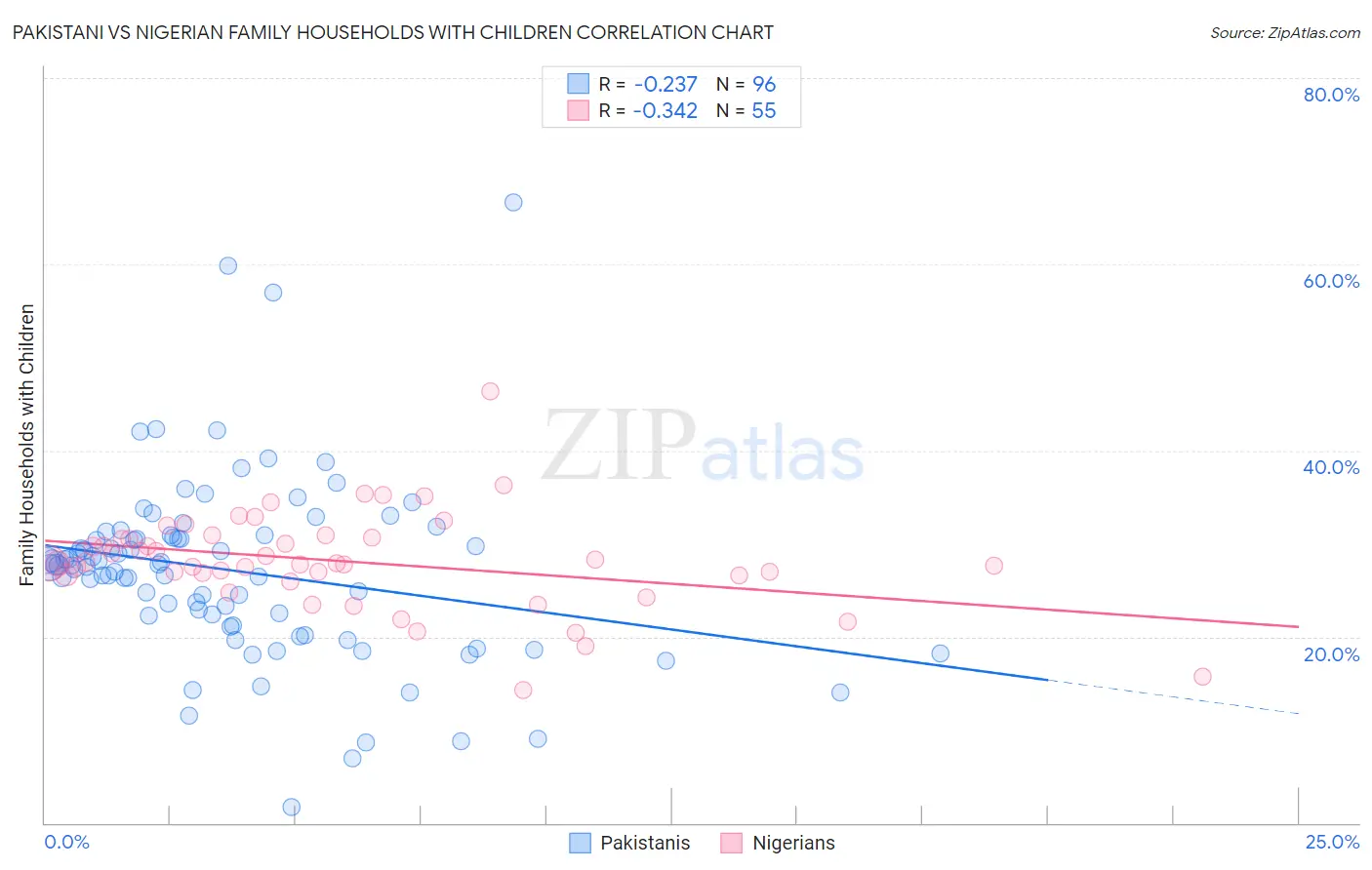Pakistani vs Nigerian Family Households with Children
COMPARE
Pakistani
Nigerian
Family Households with Children
Family Households with Children Comparison
Pakistanis
Nigerians
27.9%
FAMILY HOUSEHOLDS WITH CHILDREN
96.0/ 100
METRIC RATING
116th/ 347
METRIC RANK
28.4%
FAMILY HOUSEHOLDS WITH CHILDREN
99.8/ 100
METRIC RATING
77th/ 347
METRIC RANK
Pakistani vs Nigerian Family Households with Children Correlation Chart
The statistical analysis conducted on geographies consisting of 335,080,458 people shows a weak negative correlation between the proportion of Pakistanis and percentage of family households with children in the United States with a correlation coefficient (R) of -0.237 and weighted average of 27.9%. Similarly, the statistical analysis conducted on geographies consisting of 332,387,901 people shows a mild negative correlation between the proportion of Nigerians and percentage of family households with children in the United States with a correlation coefficient (R) of -0.342 and weighted average of 28.4%, a difference of 1.8%.

Family Households with Children Correlation Summary
| Measurement | Pakistani | Nigerian |
| Minimum | 1.7% | 14.3% |
| Maximum | 66.6% | 46.4% |
| Range | 64.9% | 32.1% |
| Mean | 27.1% | 28.1% |
| Median | 27.7% | 27.9% |
| Interquartile 25% (IQ1) | 21.8% | 26.5% |
| Interquartile 75% (IQ3) | 30.7% | 30.6% |
| Interquartile Range (IQR) | 9.0% | 4.1% |
| Standard Deviation (Sample) | 9.9% | 5.2% |
| Standard Deviation (Population) | 9.9% | 5.2% |
Similar Demographics by Family Households with Children
Demographics Similar to Pakistanis by Family Households with Children
In terms of family households with children, the demographic groups most similar to Pakistanis are Immigrants from Malaysia (27.9%, a difference of 0.010%), Central American Indian (27.9%, a difference of 0.010%), Zimbabwean (27.9%, a difference of 0.050%), European (27.9%, a difference of 0.080%), and Immigrants from Africa (28.0%, a difference of 0.13%).
| Demographics | Rating | Rank | Family Households with Children |
| Tohono O'odham | 97.6 /100 | #109 | Exceptional 28.0% |
| Spaniards | 97.4 /100 | #110 | Exceptional 28.0% |
| Scandinavians | 97.1 /100 | #111 | Exceptional 28.0% |
| Immigrants | Middle Africa | 97.0 /100 | #112 | Exceptional 28.0% |
| Arabs | 97.0 /100 | #113 | Exceptional 28.0% |
| South American Indians | 96.9 /100 | #114 | Exceptional 28.0% |
| Immigrants | Africa | 96.8 /100 | #115 | Exceptional 28.0% |
| Pakistanis | 96.0 /100 | #116 | Exceptional 27.9% |
| Immigrants | Malaysia | 95.9 /100 | #117 | Exceptional 27.9% |
| Central American Indians | 95.9 /100 | #118 | Exceptional 27.9% |
| Zimbabweans | 95.6 /100 | #119 | Exceptional 27.9% |
| Europeans | 95.4 /100 | #120 | Exceptional 27.9% |
| Immigrants | Western Asia | 93.6 /100 | #121 | Exceptional 27.9% |
| Immigrants | Zimbabwe | 92.8 /100 | #122 | Exceptional 27.8% |
| Immigrants | Northern Africa | 91.8 /100 | #123 | Exceptional 27.8% |
Demographics Similar to Nigerians by Family Households with Children
In terms of family households with children, the demographic groups most similar to Nigerians are Immigrants from Nepal (28.4%, a difference of 0.040%), Immigrants from Sri Lanka (28.4%, a difference of 0.050%), Immigrants from Jordan (28.4%, a difference of 0.060%), Immigrants from Iraq (28.4%, a difference of 0.070%), and Native/Alaskan (28.4%, a difference of 0.080%).
| Demographics | Rating | Rank | Family Households with Children |
| Immigrants | Honduras | 99.9 /100 | #70 | Exceptional 28.5% |
| Burmese | 99.9 /100 | #71 | Exceptional 28.5% |
| Immigrants | Indonesia | 99.9 /100 | #72 | Exceptional 28.5% |
| Iraqis | 99.9 /100 | #73 | Exceptional 28.5% |
| Laotians | 99.9 /100 | #74 | Exceptional 28.5% |
| Immigrants | Jordan | 99.9 /100 | #75 | Exceptional 28.4% |
| Immigrants | Sri Lanka | 99.9 /100 | #76 | Exceptional 28.4% |
| Nigerians | 99.8 /100 | #77 | Exceptional 28.4% |
| Immigrants | Nepal | 99.8 /100 | #78 | Exceptional 28.4% |
| Immigrants | Iraq | 99.8 /100 | #79 | Exceptional 28.4% |
| Natives/Alaskans | 99.8 /100 | #80 | Exceptional 28.4% |
| South Americans | 99.8 /100 | #81 | Exceptional 28.4% |
| Kenyans | 99.8 /100 | #82 | Exceptional 28.4% |
| Nicaraguans | 99.8 /100 | #83 | Exceptional 28.4% |
| Costa Ricans | 99.8 /100 | #84 | Exceptional 28.4% |